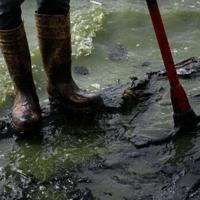A foul odor lingers over the darkened shores of Lake Maracaibo in Venezuela, where an oil spill represents the significant decline in the country’s once prosperous petroleum industry.
In this region, economic hardships dominate the conversation leading up to the July 28 elections, in which President Nicolas Maduro will be running for a third term.
“We are suffering. Fishing from the shore is no longer feasible due to the oil,” said fisherman Yordi Vicuna, 34, expressing that catches have drastically reduced.
He mentioned that nets need frequent washing or replacement due to being contaminated by leaked oil from damaged pipes that the government cannot afford to repair.
Much of Venezuela’s economic downfall, partly fueled by a sharp drop in international oil prices after 2014, has occurred under Maduro’s leadership since 2013.
Many Venezuelans, including Vicuna, attribute the dire situation to US sanctions.
“The pipeline is damaged due to the economic blockade,” claimed the fisherman, echoing the government’s official stance, while cleaning oil-soaked sand from the lake shore.
“We appeal to competent agencies and external aid to assist the government in repairing the pipelines,” Vicuna added.
– Rise and Fall –
Over a century ago, the oil-rich Maracaibo Basin played a significant role in transforming Venezuela into one of the world’s top 10 oil producers, leading to a period of remarkable prosperity.
The country, boasting the largest proven oil reserves globally, was producing 3.5 million barrels of oil per day by 2008, with the United States as its primary customer.
However, within just 12 years, production plummeted to under half a million barrels following nationalization of the industry and a prolonged strike at the state oil company PDVSA during Chavez’s presidency.
Chavez dismissed numerous PDVSA personnel and managers, replaced by inexperienced loyalists, leading to an economic crisis marked by recession and hyperinflation, causing an estimated seven million people to flee the country in under a decade.
Most analysts attribute the industry’s decline to corruption and mismanagement at PDVSA, worsened by sanctions imposed on Venezuela after Maduro’s disputed 2018 reelection.
– Environmental Devastation –
A few oil pumps still operate on the polluted shores of Lake Maracaibo, with numerous machinery lying idle.
The once-popular Puyuyo beach near the Bajo Grande refinery is now covered in oil, leaving hotels and bars closed.
“Families used to visit, but now there’s 30 centimeters of oil at the bottom of the lake,” said Guillermo Albeniz Cano, a beach cafe owner with dwindling customers.
The cafe had only one occupied table, with crabbers discussing the impact of the oil pollution on their livelihood.
Despite the challenges, some continue to fish in the less-polluted areas of the lake, like Alvaro Villamil, who admitted it’s no longer sufficient for a living.
“The lake is contaminated. It’s tough,” stated Villamil, highlighting the severe pollution in the area.
– Economic Decline –
Maracaibo, once a thriving city, now displays numerous “for sale” signs, reflecting the economic downturn with abandoned buildings and infrastructure.
While there are signs of potential recovery in Venezuela’s oil industry, the outcome relies heavily on the upcoming elections, with concerns over Maduro retaining power and further isolating the country internationally.
pgf/mlr/bjt





